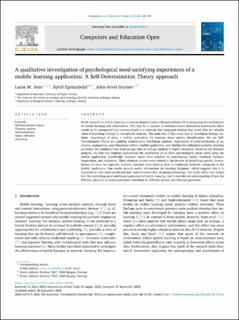| dc.contributor.author | Jeno, Lucas Matias | |
| dc.contributor.author | Egelandsdal, Kjetil | |
| dc.contributor.author | Grytnes, John Arvid | |
| dc.date.accessioned | 2022-10-03T12:33:23Z | |
| dc.date.available | 2022-10-03T12:33:23Z | |
| dc.date.created | 2022-10-02T09:45:13Z | |
| dc.date.issued | 2022 | |
| dc.identifier.issn | 2666-5573 | |
| dc.identifier.uri | https://hdl.handle.net/11250/3023375 | |
| dc.description.abstract | Much research on mobile learning is cross-sectional or lacks a theoretical basis for investigating the mechanisms of mobile learning and achievement. This may be a concern as well-formulated theoretical frameworks allow results to be interpreted and contextualized in a coherent and integrated fashion that could then be valuable when interpreting findings in educational contexts. The main aim of this study was to investigate biology students’ experiences of using a mobile application for learning about species identification. We use Self-Determination Theory as a guiding framework to investigate students’ experiences of need-satisfaction of autonomy, competence, and relatedness within a mobile application, and whether this influences students’ learning processes. We conducted four focus groups with 26 biology students in higher education. Based on our thematic analysis, we find that students experienced the satisfaction of all three psychological needs while using the mobile application. Specifically, students’ needs were satisfied by experiencing choice, feedback, mastery, cooperation, and discussion. These elements in turn were related to the process of identifying species. Contradictory to what we expected, students reported more learning from a traditional textbook, compared to the mobile application. Our results provide useful information for learning designers, which suggests that it is important to take need-satisfaction into consideration when designing technology. Our study offers new insight into the underlying need-satisfying experiences of mobile learning, and it provides an understanding of how the different elements of need-satisfaction contribute to different species identification processes. | en_US |
| dc.language.iso | eng | en_US |
| dc.publisher | Elsevier | en_US |
| dc.rights | Navngivelse 4.0 Internasjonal | * |
| dc.rights.uri | http://creativecommons.org/licenses/by/4.0/deed.no | * |
| dc.title | A qualitative investigation of psychological need-satisfying experiences of a mobile-learning application: A Self-Determination Theory approach | en_US |
| dc.title.alternative | A qualitative investigation of psychological need-satisfying experiences of a mobile-learning application: A Self-Determination Theory approach | en_US |
| dc.type | Journal article | en_US |
| dc.type | Peer reviewed | en_US |
| dc.description.version | publishedVersion | en_US |
| dc.rights.holder | Copyright 2022 the authors | en_US |
| dc.source.articlenumber | 100108 | en_US |
| cristin.ispublished | true | |
| cristin.fulltext | original | |
| cristin.qualitycode | 1 | |
| dc.identifier.doi | 10.1016/j.caeo.2022.100108 | |
| dc.identifier.cristin | 2057432 | |
| dc.source.journal | Computers & Education Open | en_US |
| dc.relation.project | Norges forskningsråd: 275681 | en_US |
| dc.identifier.citation | Computers & Education Open. 2022, 3, 100108. | en_US |
| dc.source.volume | 3 | en_US |

